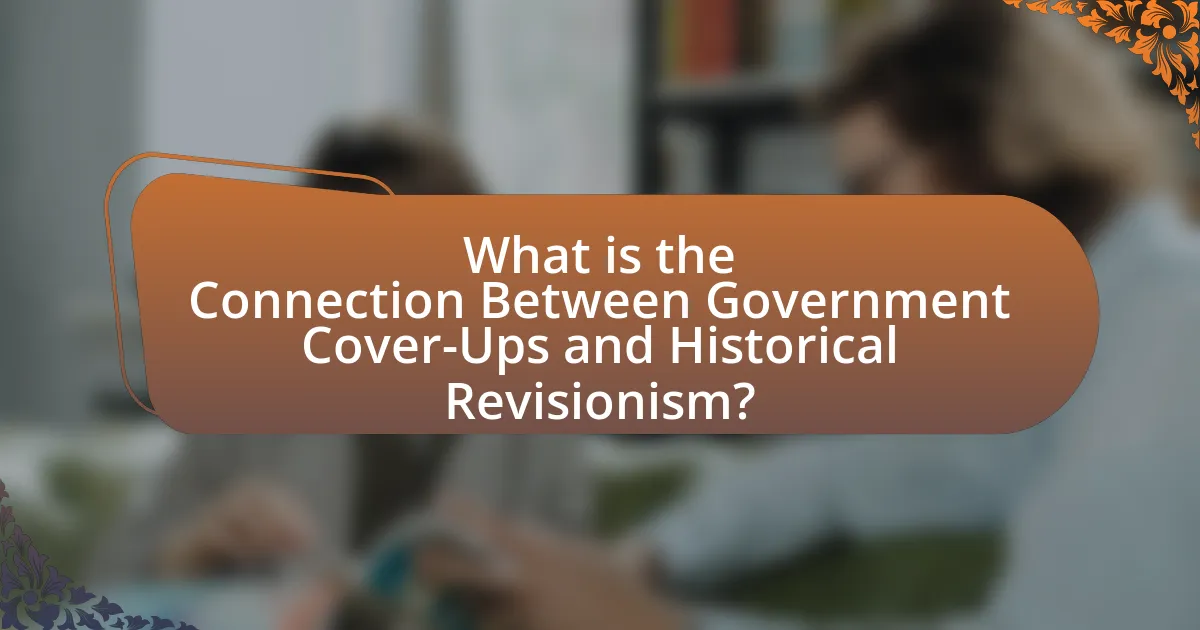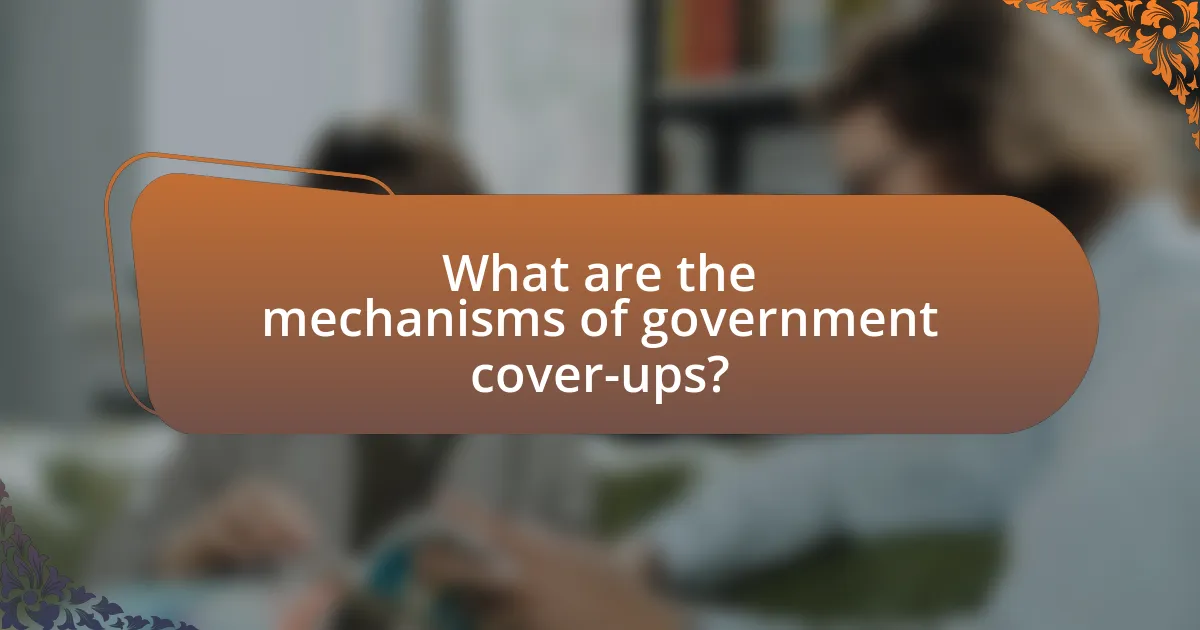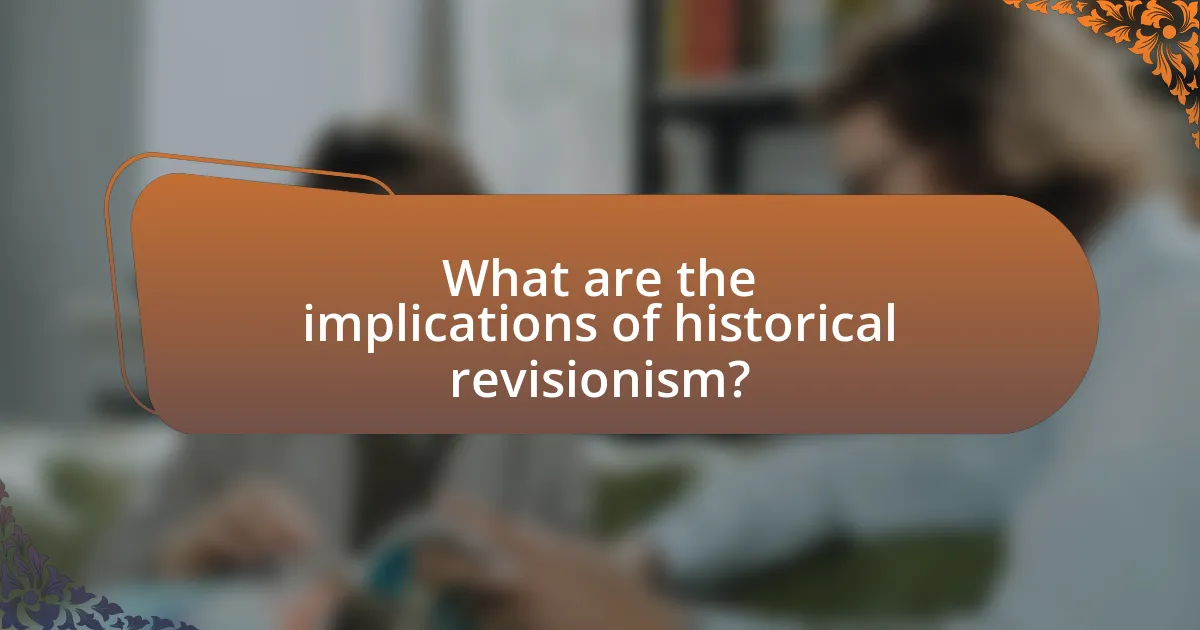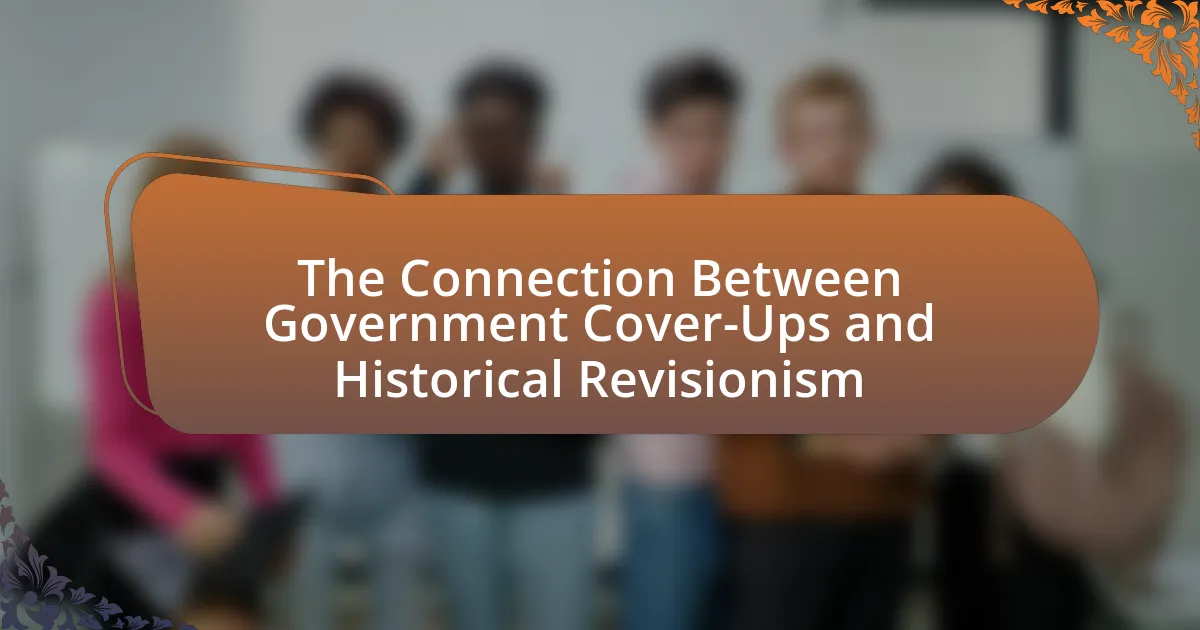The article examines the relationship between government cover-ups and historical revisionism, highlighting how both practices manipulate information to influence public perception and control narratives. It discusses notable examples, such as the Watergate scandal and the Tuskegee syphilis study, illustrating how these cover-ups distort historical understanding and shape collective memory. The article also explores the role of media in perpetuating or challenging these narratives, the ethical implications of government-led historical revisionism, and the responsibilities of citizens and institutions in promoting transparency and accountability in historical discourse. Through this analysis, the article underscores the significant impact of cover-ups and revisionism on societal trust and national identity.

What is the Connection Between Government Cover-Ups and Historical Revisionism?
Government cover-ups and historical revisionism are interconnected as both involve the manipulation of information to shape public perception and control narratives. Governments may engage in cover-ups to conceal actions or events that could lead to public outrage or loss of legitimacy, such as the Watergate scandal, where the Nixon administration attempted to hide its involvement in illegal activities. Historical revisionism often follows, as governments may alter or reinterpret historical facts to justify their actions or maintain power, exemplified by the Soviet Union’s portrayal of events like the Great Purge. This manipulation of history serves to reinforce the government’s narrative and suppress dissent, demonstrating a clear link between the two phenomena.
How do government cover-ups influence public perception of history?
Government cover-ups significantly distort public perception of history by obscuring facts and promoting alternative narratives. When governments conceal information, such as the Watergate scandal or the Tuskegee syphilis study, they create a mistrust in official accounts, leading the public to question the authenticity of historical events. This manipulation of information can result in a skewed understanding of past events, as seen in the case of the Gulf of Tonkin incident, which was initially misrepresented to justify military action in Vietnam. Consequently, the public may adopt a revised view of history that aligns with the narratives presented by those in power, ultimately shaping collective memory and influencing future political discourse.
What are some notable examples of government cover-ups affecting historical narratives?
Notable examples of government cover-ups affecting historical narratives include the Watergate scandal, the Tuskegee syphilis study, and the Iran-Contra affair. The Watergate scandal involved a break-in at the Democratic National Committee headquarters and subsequent cover-up by President Nixon’s administration, which altered public perception of government integrity and accountability. The Tuskegee syphilis study, conducted by the U.S. Public Health Service, involved the unethical treatment of African American men who were misled about their health status, significantly impacting trust in medical institutions and altering narratives around race and ethics in healthcare. The Iran-Contra affair involved secret U.S. arms sales to Iran to fund Contra rebels in Nicaragua, which contradicted official U.S. policy and led to a significant shift in public understanding of U.S. foreign policy and governmental transparency. Each of these events illustrates how government actions can obscure the truth and reshape historical narratives.
How do these cover-ups shape collective memory and identity?
Government cover-ups significantly shape collective memory and identity by altering public perceptions of historical events. These cover-ups often lead to misinformation or a lack of information, which can create a distorted narrative that influences how communities remember their past. For instance, the Watergate scandal in the 1970s not only revealed governmental misconduct but also reshaped American political identity by fostering distrust in government institutions. This distrust has persisted, affecting how citizens engage with political processes and view authority. Additionally, the suppression of events like the Tiananmen Square protests in 1989 by the Chinese government has led to a collective memory that is heavily influenced by state narratives, impacting national identity and the discourse surrounding democracy in China. Such cover-ups can create a chasm between official history and public understanding, ultimately shaping societal values and collective identity over time.
Why is historical revisionism often linked to government actions?
Historical revisionism is often linked to government actions because governments may seek to reshape public perception and control narratives about past events to maintain legitimacy or justify current policies. For instance, authoritarian regimes frequently alter historical accounts to suppress dissent and promote a specific ideology, as seen in the Soviet Union’s manipulation of history under Stalin, where events were rewritten to glorify the state and erase opposition. This connection highlights how governments utilize historical revisionism as a tool for political power and social cohesion.
What motivations drive governments to revise historical accounts?
Governments revise historical accounts primarily to shape national identity and maintain political legitimacy. By altering narratives, they can promote a version of history that aligns with current ideologies or policies, thereby reinforcing their authority. For instance, in post-war Japan, the government has been criticized for downplaying wartime atrocities in educational materials to foster a sense of national pride and stability. This selective representation of history can also serve to distract from contemporary issues or failures, as seen in various authoritarian regimes that manipulate history to justify their rule.
How does the public respond to historical revisionism initiated by governments?
The public often responds to historical revisionism initiated by governments with skepticism and resistance. This reaction is rooted in a desire for transparency and an accurate representation of history, as seen in various instances where citizens challenge government narratives. For example, in countries like Turkey, the government’s denial of the Armenian Genocide has led to widespread protests and demands for acknowledgment from both domestic and international communities. Additionally, public backlash can manifest through social media campaigns, academic discourse, and grassroots movements aimed at preserving historical truths. Such responses highlight the importance of collective memory and the role of civil society in holding governments accountable for their historical narratives.
What role does media play in the connection between cover-ups and revisionism?
Media serves as a crucial intermediary in the relationship between cover-ups and revisionism by shaping public perception and influencing narratives. Through selective reporting, media can either expose government cover-ups or perpetuate them by omitting critical information, thereby facilitating historical revisionism. For instance, the Watergate scandal exemplifies how investigative journalism uncovered a significant cover-up, leading to a revision of public understanding regarding government integrity. Conversely, media can also propagate revisionist narratives by framing events in a way that aligns with specific political agendas, as seen in various historical accounts of conflicts where media portrayal has altered public memory. This dual role underscores the media’s power in either challenging or reinforcing distorted historical narratives.
How do media narratives support or challenge government cover-ups?
Media narratives can both support and challenge government cover-ups by shaping public perception and influencing discourse. When media outlets propagate government narratives without scrutiny, they reinforce cover-ups, as seen in the initial reporting of the Gulf of Tonkin incident, which justified U.S. military escalation in Vietnam based on misleading information. Conversely, investigative journalism can expose government malfeasance, as demonstrated by the Watergate scandal, where media coverage led to the resignation of President Nixon after uncovering a cover-up involving illegal activities. Thus, the role of media is pivotal in either perpetuating or dismantling government cover-ups, depending on the nature of the reporting and the commitment to journalistic integrity.
What impact does investigative journalism have on uncovering historical truths?
Investigative journalism significantly impacts uncovering historical truths by exposing hidden facts and challenging official narratives. This form of journalism often reveals government cover-ups, as seen in the Watergate scandal, where investigative reporters uncovered a conspiracy that led to President Nixon’s resignation. Such revelations not only correct the historical record but also promote accountability and transparency, as demonstrated by the Pentagon Papers, which disclosed the U.S. government’s misleading information about the Vietnam War. Through rigorous research and fact-checking, investigative journalism plays a crucial role in ensuring that historical truths are accurately represented and understood.

What are the mechanisms of government cover-ups?
Government cover-ups typically involve mechanisms such as misinformation, suppression of evidence, and manipulation of public perception. Misinformation is disseminated through controlled media narratives that downplay or distort facts, as seen in the Watergate scandal where the Nixon administration attempted to mislead the public about its involvement. Suppression of evidence occurs when governments restrict access to documents or data, exemplified by the classified files related to the assassination of John F. Kennedy, which remain sealed to this day. Manipulation of public perception is achieved through propaganda and strategic communication, as demonstrated during the Gulf of Tonkin incident, where misleading reports were used to justify military action in Vietnam. These mechanisms collectively serve to obscure the truth and maintain governmental authority.
How do governments implement cover-ups effectively?
Governments implement cover-ups effectively by controlling information, manipulating narratives, and utilizing strategic communication. They often restrict access to sensitive data, as seen in cases like the Watergate scandal, where the Nixon administration attempted to suppress evidence of wrongdoing. Additionally, governments may employ disinformation campaigns to shape public perception, exemplified by the Soviet Union’s portrayal of events during the Chernobyl disaster, which downplayed the severity of the incident. By leveraging media and public relations tactics, they can redirect attention and create alternative narratives that obscure the truth, as demonstrated in various historical contexts where official accounts have been revised to align with political agendas.
What strategies are commonly used to suppress information?
Common strategies used to suppress information include censorship, disinformation campaigns, and legal restrictions. Censorship involves the removal or prohibition of information deemed sensitive or harmful, often executed by governments or organizations to control public perception. Disinformation campaigns spread false or misleading information to confuse or mislead the public, undermining trust in credible sources. Legal restrictions, such as laws against whistleblowing or freedom of information, limit access to information and protect those in power from scrutiny. Historical examples include the censorship of dissenting voices during authoritarian regimes and the manipulation of historical narratives to align with political agendas, demonstrating the effectiveness of these strategies in shaping public understanding and memory.
How do governments manage public relations during a cover-up?
Governments manage public relations during a cover-up by employing strategic communication tactics to control the narrative and mitigate public backlash. They often utilize misinformation, selective transparency, and media manipulation to shape perceptions and divert attention from the issue at hand. For instance, during the Watergate scandal, the Nixon administration attempted to downplay the severity of the situation through misleading statements and by discrediting investigative journalists. This approach illustrates how governments can leverage public relations to obscure the truth and maintain authority, often leading to historical revisionism as the official narrative is altered to fit a more favorable portrayal of events.
What are the consequences of government cover-ups on historical understanding?
Government cover-ups significantly distort historical understanding by obscuring facts and manipulating narratives. When governments conceal information, they create gaps in the historical record, leading to misconceptions and a lack of accountability. For instance, the Watergate scandal in the 1970s revealed how government secrecy can alter public perception and trust in institutions, ultimately reshaping historical narratives about political integrity. Additionally, the cover-up of the My Lai Massacre during the Vietnam War delayed public awareness of military misconduct, affecting historical interpretations of U.S. involvement in Vietnam. Such actions not only mislead the public but also hinder scholarly research, as historians struggle to piece together accurate accounts from incomplete or biased sources.
How do cover-ups distort historical facts and narratives?
Cover-ups distort historical facts and narratives by intentionally concealing or altering information to shape public perception. For instance, the Watergate scandal involved a government cover-up that obscured the truth about political misconduct, leading to a skewed understanding of presidential accountability. This manipulation of facts can create a false narrative, as seen in the portrayal of events like the Gulf of Tonkin incident, where misleading information justified military action in Vietnam, ultimately altering public perception and historical interpretation. Such actions not only misinform the public but also hinder the ability to learn from past mistakes, thereby affecting future governance and societal trust.
What long-term effects do cover-ups have on society’s trust in government?
Cover-ups significantly erode society’s trust in government over the long term. When governments engage in cover-ups, they create a perception of dishonesty and lack of transparency, leading citizens to question the integrity of their leaders and institutions. Historical examples, such as the Watergate scandal in the 1970s, demonstrate that once trust is broken, it can take decades for it to be restored, if at all. Studies indicate that public trust in government institutions declines sharply following revelations of cover-ups, as seen in the aftermath of the Iraq War, where misinformation about weapons of mass destruction led to lasting skepticism about government narratives. This erosion of trust can result in decreased civic engagement, lower voter turnout, and a general disillusionment with democratic processes, ultimately undermining the social contract between citizens and their government.
How can citizens identify and challenge government cover-ups?
Citizens can identify and challenge government cover-ups by actively researching information, utilizing freedom of information laws, and engaging in public discourse. Researching involves examining credible sources, such as investigative journalism, academic studies, and historical records, to uncover inconsistencies or hidden facts. For instance, the Pentagon Papers revealed government deception regarding the Vietnam War, demonstrating the importance of whistleblowers and leaked documents in exposing cover-ups. Utilizing freedom of information laws allows citizens to request access to government documents that may reveal suppressed information. Engaging in public discourse through social media, community forums, and advocacy groups can amplify concerns and mobilize collective action, as seen in movements like the Watergate scandal, where public pressure led to significant political accountability.
What tools and resources are available for uncovering hidden histories?
Tools and resources available for uncovering hidden histories include archival research, digital databases, oral histories, and historical societies. Archival research allows access to primary documents, such as government records and personal letters, which can reveal suppressed narratives. Digital databases, like JSTOR and Google Scholar, provide access to scholarly articles and historical journals that analyze past events critically. Oral histories collected from individuals can offer personal insights and perspectives that challenge official accounts. Historical societies often maintain collections and provide expertise in local history, facilitating deeper understanding of regional narratives. These resources collectively enable researchers to piece together overlooked or marginalized histories, contributing to a more comprehensive understanding of the past.
How can public discourse influence the exposure of cover-ups?
Public discourse can significantly influence the exposure of cover-ups by fostering transparency and accountability through collective scrutiny. When citizens engage in open discussions, share information, and raise questions about government actions, they create an environment that pressures authorities to disclose hidden truths. Historical examples, such as the Watergate scandal, illustrate how investigative journalism and public debate led to the revelation of governmental misconduct, ultimately resulting in President Nixon’s resignation. This demonstrates that active public engagement can dismantle barriers to information and compel institutions to confront their past actions, thereby facilitating the exposure of cover-ups.

What are the implications of historical revisionism?
Historical revisionism can lead to significant implications, including the distortion of collective memory and the shaping of national identity. By altering historical narratives, revisionism can influence public perception and policy, often serving political agendas. For instance, the revision of events surrounding World War II has been used by various governments to foster nationalism or justify contemporary actions. This manipulation of history can result in societal divisions, as differing interpretations of the past create conflict among groups. Additionally, historical revisionism can undermine trust in institutions, as citizens may question the authenticity of official accounts and seek alternative narratives.
How does historical revisionism affect education and scholarship?
Historical revisionism significantly impacts education and scholarship by altering the interpretation of historical events, which can lead to a shift in curricula and academic discourse. For instance, when historical narratives are revised to reflect new evidence or perspectives, educators may incorporate these changes into teaching materials, thereby influencing students’ understanding of history. This can be seen in the re-evaluation of events such as the Vietnam War, where new documents have prompted a reassessment of U.S. involvement, leading to a more nuanced portrayal in educational settings. Furthermore, scholarly debates surrounding historical revisionism can foster critical thinking and encourage students to analyze multiple viewpoints, enhancing their analytical skills. However, it can also lead to controversies, as differing interpretations may clash, affecting the credibility of academic institutions and the trust in educational content.
What challenges do educators face when teaching revised histories?
Educators face significant challenges when teaching revised histories, primarily due to resistance from students, parents, and educational institutions. This resistance often stems from differing political beliefs and cultural values, which can lead to contentious classroom discussions. For instance, when educators present alternative narratives about events like colonization or civil rights movements, they may encounter pushback from those who feel that these perspectives undermine traditional views. Additionally, educators must navigate state standards and curricula that may not align with revised historical interpretations, limiting their ability to teach comprehensively. Research indicates that educators often feel pressured to conform to established narratives, which can stifle critical thinking and open dialogue about historical events.
How can academic institutions promote critical thinking about historical narratives?
Academic institutions can promote critical thinking about historical narratives by integrating interdisciplinary approaches that encourage analysis of multiple perspectives. This can be achieved through curriculum design that includes diverse historical sources, critical discussions, and assignments that require students to evaluate the reliability and bias of different narratives. For instance, incorporating primary documents, scholarly articles, and multimedia resources allows students to engage with history actively, fostering a deeper understanding of how government cover-ups and historical revisionism shape public perception. Research indicates that students exposed to varied viewpoints are more likely to develop critical analytical skills, as demonstrated in studies like “Teaching Critical Thinking: Some Practical Strategies” by Stephen D. Brookfield, which highlights the effectiveness of diverse educational methods in enhancing critical thinking.
What ethical considerations arise from government-led historical revisionism?
Government-led historical revisionism raises significant ethical considerations, primarily concerning truth, accountability, and the manipulation of collective memory. The alteration or suppression of historical facts by governments can lead to a distorted understanding of past events, undermining public trust in institutions. For instance, the revision of narratives surrounding events like the Holocaust or colonialism can perpetuate harmful ideologies and deny victims their rightful recognition. Furthermore, ethical implications arise when such revisionism serves to justify current policies or actions, as seen in cases where governments downplay atrocities to maintain national pride or political power. This manipulation can hinder societal progress by preventing honest discourse about historical injustices, ultimately affecting the moral fabric of society.
How do ethical dilemmas impact historians and researchers?
Ethical dilemmas significantly impact historians and researchers by influencing their decision-making processes regarding the interpretation and presentation of historical facts. When faced with conflicting moral principles, such as the obligation to present accurate information versus the potential consequences of revealing sensitive data, historians may alter their narratives or withhold information. For instance, the ethical considerations surrounding the disclosure of government cover-ups can lead historians to engage in historical revisionism, where they may either emphasize or downplay certain events to align with ethical standards or personal beliefs. This dynamic can result in a skewed understanding of history, as seen in cases like the portrayal of the Vietnam War, where differing ethical viewpoints shaped public narratives and academic discourse.
What responsibilities do governments have in presenting accurate histories?
Governments have the responsibility to present accurate histories to ensure transparency, foster trust, and promote informed citizenship. Accurate historical representation allows citizens to understand their past, which is crucial for making informed decisions about the future. For instance, when governments acknowledge historical injustices, such as the internment of Japanese Americans during World War II, they contribute to a more comprehensive understanding of societal issues and help prevent the repetition of past mistakes. Furthermore, accurate histories support national identity and cohesion, as seen in countries that embrace their diverse narratives, leading to a more inclusive society.
What practical steps can individuals take to engage with historical narratives critically?
Individuals can engage with historical narratives critically by analyzing multiple sources, questioning the motives behind narratives, and recognizing biases. Analyzing multiple sources allows individuals to compare different perspectives and identify inconsistencies, which is crucial in understanding events like government cover-ups. Questioning the motives behind narratives helps individuals discern whether information is presented to serve a specific agenda, as seen in cases of historical revisionism where governments may alter facts to shape public perception. Recognizing biases, both in sources and personal viewpoints, enables individuals to approach historical narratives with a more balanced perspective, fostering a deeper understanding of the complexities involved in historical events.
How can citizens promote transparency and accountability in historical discourse?
Citizens can promote transparency and accountability in historical discourse by actively engaging in research, advocating for open access to historical documents, and participating in public discussions. By conducting independent research, citizens can uncover overlooked narratives and challenge dominant historical interpretations. Advocating for open access to archives and government documents, such as the Freedom of Information Act in the United States, allows citizens to obtain information that may reveal government cover-ups or historical revisionism. Furthermore, participating in public forums, educational initiatives, and community discussions fosters a culture of accountability, encouraging diverse perspectives and critical examination of historical narratives. These actions collectively empower citizens to hold institutions accountable for their portrayal of history.
What role does civic engagement play in shaping historical understanding?
Civic engagement plays a crucial role in shaping historical understanding by fostering active participation in democratic processes and encouraging critical examination of historical narratives. When citizens engage in discussions, advocacy, and community activities, they contribute diverse perspectives that challenge dominant historical accounts, often revealing overlooked or suppressed information. For instance, grassroots movements have historically influenced the recognition of civil rights issues, as seen in the Civil Rights Movement, where civic engagement led to a reevaluation of American history regarding race relations. This active involvement not only promotes a more inclusive understanding of history but also holds governments accountable for their actions, thereby countering potential cover-ups and revisionist narratives.
